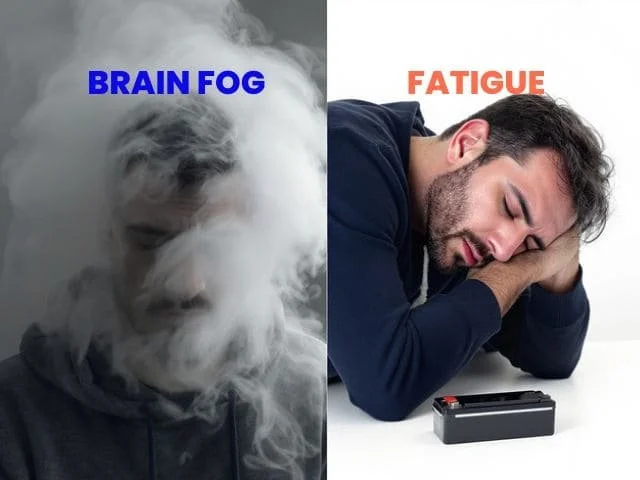Brain Fog vs Regular Fatigue: Know the Difference
Brain Fog vs Fatigue - Wait, Is It Foggy in Here or Am I Just Tired?
Ever opened your laptop, stared blankly at the screen, and wondered if your brain got swapped out for a bowl of mashed potatoes overnight? Hey, same. Welcome to the club nobody asked to join: people who wonder, “Is this brain fog? Or am I just tired?”. Let’s talk in more detail about brain fog vs fatigue.
If you’re living with Multiple Sclerosis (MS), chronic illness, or spend most of your work life online, you’ve probably Googled both “why am I so exhausted” and “do I have cognitive decline or am I just on my fifteenth Zoom this week?”
Spoiler: brain fog and fatigue are not twins. In fact, knowing which one’s crashing your mental party could completely change the way you cope.
Instead of another list of “get more sleep” tips, let’s actually break down what’s going on inside your head. Ready to clear the mist?
Brain Fog: What Is It Really?
Remote work comes with unique challenges. This scene demonstrates how brain fog and fatigue may impact productivity from home.
Definition: Brain fog isn’t a medical diagnosis, but try telling that to your logic circuits when you forget your passwords five seconds after creating them. According to researchers, “brain fog” describes a constellation of temporary cognitive dysfunction: slow thinking, trouble concentrating, forgetfulness, confusion, and hazy processing.
What Causes Brain Fog?
Chronic illness (MS, lupus, rheumatoid arthritis, CFS/ME, etc.)
Long Covid, perimenopause, thyroid issues, autoimmune flares
Poor sleep, stress, certain meds, literal malnutrition
Big hormone shifts (looking at you, menopause and puberty)
Fun fact: Brain fog is normal in perimenopause and often linked to hormonal chaos plus, you guessed it, sleep disruption.
It’s often perceived as mental fatigue, but it’s more about cognitive breakdown than sheer lack of energy.
What Does It Feel Like?
Like your brain’s WiFi is running on dial-up
Slow to access info or find words
Focusing takes effort, memory gets slippery, and multitasking is a joke
Sometimes paired with actual fatigue, but not always
You’re aware of the fog, but willing yourself “out” doesn’t help
“Why can’t I just push through it like tiredness?” Because it is not just tiredness—your brain’s processing system is momentarily jammed.
Fatigue: More Than “Just Being Tired”
What Causes Fatigue?
Chronic illnesses (MS, autoimmune diseases, cancer)
Sleep deprivation (classic)
Overwork and general stress
Dehydration, poor nutrition, iron deficiency, medication effects
Depression, anxiety, you-name-it (see: modern life)
What Does It Feel Like?
Physical heaviness—muscles feel “cementy”
“Sleepy-tired” that doesn’t leave with a nap
Motivation zapped, “battery bar” reads 2%
May include “mental fatigue,” but rest sometimes helps
Key Point: You can be fatigued without brain fog, and vice versa. But they’re happy to overlap, especially in autoimmune conditions, long Covid, or when Netflix autoplay goes too hard.
This visual highlights the key differences between brain fog, represented by a clouded head, and regular fatigue, shown as total body tiredness.
Brain Fog vs Fatigue: Side-by-Side Comparison
| Brain Fog | Fatigue | |
|---|---|---|
| Symptoms | Slow thinking, forgetfulness, poor focus, confusion | Persistent tiredness, low energy, sleepiness |
| Triggers | MS, autoimmunity, hormonal shifts, stress, poor sleep | Illness, overwork, poor sleep, infections |
| Feels like | Cognitive "sludge," mind is stuck in molasses | Body and brain both out of fuel |
| Rest helps? | Not always; fog can persist after a nap | Sometimes; sleep or pauses may help |
| Assessed by | Self-report, cognitive testing | Self-report, sometimes physical/endurance |
| Lasts | Hours to days, can be chronic in illness | Variable, often linked to activity/rest |
Bottom line: Brain fog = "my brain won't brain" Fatigue = "my everything is done" You can have both, separately or together.
Why This Difference Matters for MS, Chronic Illness & Remote Work
MS & Chronic Illness: For people with MS, ME/CFS, lupus, and other chronic illnesses, fatigue and brain fog can be the most disabling symptoms. Treatment is different—brain fog may need cognitive strategies, while fatigue needs pacing, nutrition, and rest.
Remote Work: Office life lets you hide a coffee-powered yawn, but Teams meetings are less forgiving when you can’t remember words. Knowing if it’s fatigue or fog can help you plan breaks, ask for accommodations, and prioritize (or automate) your workload.
Treatment: Meds that boost wakefulness don’t always help cognitive clarity. And “work harder” is a recipe for wipeouts, not productivity.
For tailored guidance, check out our deep dives: Brain Fog Survival Kit and The 2 PM Energy Crash Survival Guide.
How to Cope: Practical Strategies (and the Wrong Way)
Chronic illness and MS can bring both brain fog and fatigue. This image shows support in action—reminding readers they’re not alone.
For Brain Fog:
Chunk work into microtasks (lower cognitive load means less slog)
Brain breaks—quick walks, change scenery, hydrate
Tools: Use lists, timers, and reminders. Even (especially!) if you “shouldn’t need them”
Cognitive rehab/therapy (for severe, persistent fog)
Light exercise
Learn your patterns: Are you foggier after lunch? First thing? Work around that—not against it
For Fatigue:
Pacing: Alternate work/rest periods. Don’t “power through” (It’s overrated.)
Nutrition & hydration: Tiny, frequent, energy-sustaining snacks
Prioritize sleep: Naps are healing, not lazy
Movement: Gentle stretching, yoga, pacing—not marathons!
Ask for support: Both professionally and personally
What Not to Do:
Ignore it (“Just sleep more!”): Not always the solution—especially for neurological illness
Feel guilty: Both are symptoms, not failures of willpower
Take random supplements: Only do so based on accredited medical advice
Self-”diagnose” endlessly online: See your doctor for persistent symptoms
FAQs: Your Most-Googled Brain Fog & Fatigue Questions
Can fatigue cause brain fog (or vice versa)?
Yes, fatigue can worsen cognitive performance, but brain fog describes specific mental slowness, not just tiredness.
I slept 10 hours—why am I still foggy?
Brain fog is often unrelated to total hours of sleep. Poor sleep can cause both, but so can inflammation, hormonal changes, or post-viral syndromes.
Are there medical tests to diagnose brain fog?
Not directly. Doctors may check for underlying causes, but brain fog is assessed by self-report and sometimes cognitive testing.
Do people without chronic illness get brain fog?
Absolutely! Stress, acute illness, perimenopause, and jet lag can all bring it on. In chronic illness, it’s just more frequent/more severe.
Is “cognitive fatigue” just another name for brain fog?
Not quite. Cognitive fatigue is when prolonged thinking makes your brain feel tired; brain fog is when clarity is lost no matter what (e.g. in MS “cog fog” days).
Is brain fog a real MS symptom?
Absolutely. Brain fog affects up to 70% of people with MS. MyMSTeam has detailed information about the connection. The tools in this article are designed specifically for these cognitive challenges.
Wrap Up: The “Not-So-Fine” Print
If fatigue is the body’s flat tire, brain fog is the engine stalling on a foggy morning. Both are real, measurable, and deserve respect, not shame. Proper management starts by naming what you’re fighting—and then fighting smart.
Want more non-fluffy advice on thriving with chronic illness, MS, or remote work? Check these out:
And remember, even on slow days, you’re doing better than you think!
For step-by-step guidance on making your smartphone a true ally during brain fog or flare days, see our complete Phone Productivity Setup for Chronic Illness guide—packed with actionable strategies and tech tips to help you stay productive when focus is at its lowest.



